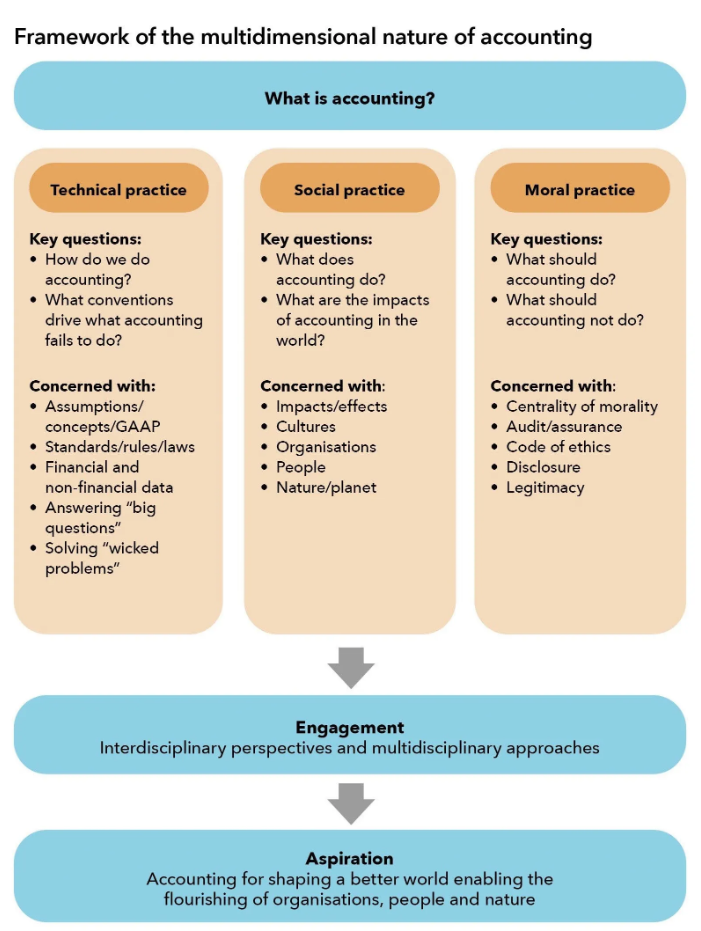How should we redefine accounting?
April 14, 2023
A broader, clearer, more realistic definition of accounting is an essential step towards shaping a better world and enhancing the profession’s attractiveness, argue Garry Carnegie and Jennifer Rose FCA.
What is accounting today? This question has been asked many times by students considering the profession as a career. In the past, the role of accounting was seen as measuring, recording, classifying, summarising and communicating information for use in decision making, but accounting education and research is moving on.
Accounting’s purpose is now much broader. Its influence and contribution to society has progressed to a much more meaningful role. By emphasising this role, future generations can be inspired to truly make a difference to the world by becoming chartered accountants.
Young people are more concerned than ever about the climate crisis and its impacts. They want to address other ‘wicked problems’ and answer ‘big questions’. They are more concerned about the sustainability of the planet and shaping a better world than other generations. However, not all of them realise that accounting has a significant impact on how we think and what we do, whether intended or unintended.
Today, roles in accounting have moved far beyond information processing. The work of chartered accountants modifies and shapes the organisations they operate in. They influence human behaviour, organisational and societal culture, the values of our communities, and the effects the organisations have on our natural environment. To reflect this changed and dynamic role, Carnegie, Parker and Tsahuridu (2021a, 2021b) propose redefining accounting as:
“A technical, social and moral practice concerned with the sustainable utilisation of resources and proper accountability to stakeholders to enable the flourishing of organisations, people and nature.”
This definition carries important implications for the education of accountants, the work of ICAEW members and the profession’s attractiveness. It recognises that while the technical practice of accounting is important, including how events are recorded and categorised, modern broader reports produced by accountants go far beyond the use of double entry bookkeeping.
As social practice, accounting orders our lives by means such as key performance indicators (KPIs). There are many examples where KPIs are aggressively set and narrowly based to the detriment of cultures within organisations. Unquestionably, accounting impacts organisations, people and nature. By emphasising its role in shaping a better world, a new generation of chartered accountants can be inspired to make a difference in the world – not just within the domain of accounting, but across all sectors.
The moral practice of accounting cannot be denied. We see time and again when accountants’ actions and inactions affect others. ICAEW members follow the ICAEW Code of Ethics, but more than this, accountants contribute to shaping the moral order and accountability infrastructures of organisations and society.
This broad-scope stewardship role in society needs to be emphasised to those considering the profession. This would allow the accountants of the future to enable organisations, people and nature to flourish with an overarching concern for, and concentration on, “the sustainable utilisation of resources and proper accountability to stakeholders”.
The framework below shows how this multidimensional definition can be applied to reflect and understand the comprehensive nature of accounting. It uses a framework of fundamental questions, developed for each of these key conceptions of accounting: technical practice, social practice, and moral practice.

Figure 1 – Meditari developed by Carnegie, Gomes and McBride, 2023
This definition of accounting and the compatible framework for its application firmly positions accountants as leaders in addressing the challenges facing us all. This is attractive – and indeed stimulating – to students, and should be used to inspire the brightest and best entrants into a profession where they can truly make a difference. As chartered accountants, they will be able to focus on the broad scope of the flourishing of organisations, people and nature in order to shape a better world for all.
Garry Carnegie, Emeritus Professor of RMIT University, Melbourne, Victoria, Australia and Jennifer Rose FCA, Senior Lecturer, Alliance Manchester Business School, University of Manchester
[ICAEW Insights]

